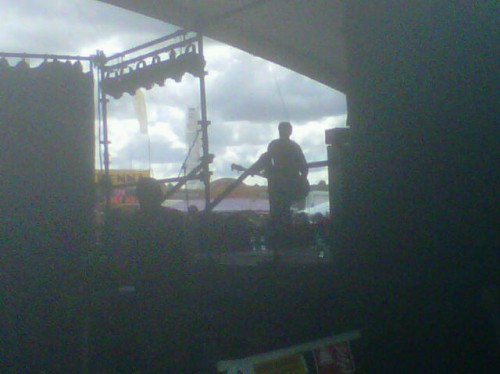
The worst of Bank Holiday weather looked set to threaten the revellers of all ages descending on Bramham in bus-loads this weekend for the start of the annual mega-party that is the Leeds Festival.
It’s a disparate bunch that makes the pilgrimage, staying for the day or pitching their tents on the sprawling, miles-long campsite: teenagers celebrating their GCSE results and a taste of Lord of the Flies style freedom from home; young parents bringing along their kids; grey-haired old rockers tapping their feet at the back of the huge crowded tents well into the night.
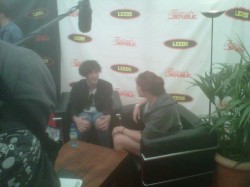 And as well as all that, the show welcomes scores of students from Leeds Met year after year to work and volunteer on the site as part of the university’s unique, much-lauded, and now well-established relationship with Festival Republic.
And as well as all that, the show welcomes scores of students from Leeds Met year after year to work and volunteer on the site as part of the university’s unique, much-lauded, and now well-established relationship with Festival Republic.
Rebekka Kill has been co-ordinating the partnership since it was established, and she invited me along to Leeds Fest this weekend to see it in action.
This year, over a thousand students, staff, and alumni of Leeds Met applied to join the team headed not only to Leeds Fest but also to Latitude in Suffolk, and even to a festival in Norway. Over three hundred were selected, joining the crew behind the scenes, gaining real practical experience in everything from stage management and artist liaison through to filming, public relations, and simply being on hand to help festival-goers on their way.
Rebekka met me as I arrived on site early on Saturday afternoon, contending with the elements from the off: hot bursts of sun followed by violent rainy tantrums, all day long – standard end-of-summer fare. She introduced me to the site, and to the glamorous and exclusive backstage areas (read dirt-track pathways and portakabins), and led me to the BBC Introducing Stage where an eclectic mix of unsigned new talent was billed throughout the weekend.
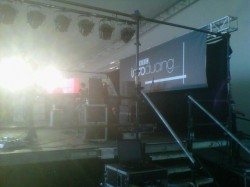 The BBC stage is where the Leeds Met students working with Festival Republic in stage management run the show. With Katie looking after the bands that arrived ready to perform (tight jeans, vintage leather, thick-rimmed spectacles which look like they’re from the joke shop, and half-finished haircuts – the performers stand out a mile) as artist liaison, and Ade and crew switching in the tight twenty-minute gap between each set, it was a tight operation they had running.
The BBC stage is where the Leeds Met students working with Festival Republic in stage management run the show. With Katie looking after the bands that arrived ready to perform (tight jeans, vintage leather, thick-rimmed spectacles which look like they’re from the joke shop, and half-finished haircuts – the performers stand out a mile) as artist liaison, and Ade and crew switching in the tight twenty-minute gap between each set, it was a tight operation they had running.
Nearby, the roving film crew was out and about collecting footage for its nightly show from Leeds Fest. The only unchaperoned camera crew in the entire festival, they are given more access even than the Beeb. Each day during the festival, they produce a three-minute round-up bringing together the work of the journalists and researchers in the press tent and the PR team spreading the word online (check out their blog here and their active Twitter stream).
To get a sense of what these guys have to contend with, imagine a thriving 24-hour broadcast newsroom: things are constantly changing, people and stories always on the move, priorities have to be shifted, and time is never on your side. Take away the luxury of operating in one small newsroom where everyone is only a phone call from you. Then add the blaring noise from every stage, rowdy revellers at every turn, and interviewees on their way who are probably already drunk. Producing their shows and writing their stories in the thick of the action at Leeds Fest, the film crew and the journalists have the training to go out and report from Tripoli soon enough.
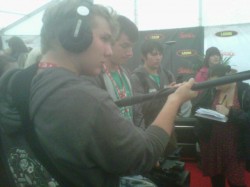 I headed out with the camera crew on a light period of the afternoon, casually catching some footage of festival-goers enjoying a brief glimpse of sunshine. Within minutes, we were called down to the press tent in the secluded guest area where up-and-coming Leeds band Pulled Apart By Horses were waiting to be interviewed – but only when there was space in the interview area to start recording.
I headed out with the camera crew on a light period of the afternoon, casually catching some footage of festival-goers enjoying a brief glimpse of sunshine. Within minutes, we were called down to the press tent in the secluded guest area where up-and-coming Leeds band Pulled Apart By Horses were waiting to be interviewed – but only when there was space in the interview area to start recording.
One man who deserves a special mention I didn’t even meet: as editor, Matt’s job is to wait in a van onsite throughout the day for the footage the cameramen collect, and to compile the film at the end of the evening. It seemed cruel to be cooped up all day in the midst of the fun and frolics (and hard work, of course) enjoyed by everyone else – but I’m assured that Matt had the chance to get out and see some of the festival for himself too. The smallest reward they all deserve for their hard work and dedication is that we watch what they produced day after day here.
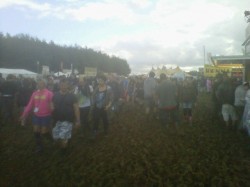 As well as festival interns gaining experience in PR, journalism, film, events management, and so much more, a large cohort arrives from Leeds Met to make up the Helpful Arena Teams (HATs) all across the site. Standing out from the crowd with their green Leeds Met t-shirts and adorned in sashes reading ‘Information’, they are there to help out revellers throughout the day. Most of them, I’m told, were merely asked how to get to this or that stage. Some of course had the odd smart-alecky question: “What’s the capital of France?” A handful were even bold enough to ask the HATs when the rain would stop.
As well as festival interns gaining experience in PR, journalism, film, events management, and so much more, a large cohort arrives from Leeds Met to make up the Helpful Arena Teams (HATs) all across the site. Standing out from the crowd with their green Leeds Met t-shirts and adorned in sashes reading ‘Information’, they are there to help out revellers throughout the day. Most of them, I’m told, were merely asked how to get to this or that stage. Some of course had the odd smart-alecky question: “What’s the capital of France?” A handful were even bold enough to ask the HATs when the rain would stop.
This small army makes up the central force that galvanizes the partnership between Leeds Met and Festival Republic – and which is why the organizer, the Hull-born festival powerhouse Melvin Benn, welcomes them back with open arms year after year, giving all the interns unrivalled opportunities in their chosen field and profound experience, as well as a lot of fun.
Managing the teams on the day was Patsy Robertshaw, who lectures at the Business School and works with Leeds Met marketing when she is not looking after the students on the project. When I met her had been running on the best part of an hour’s sleep, looking after the volunteers and interns all day and even through the night with the campsite DJs working their vinyl magic into the small hours.
Patsy has, I’m told, the skill to be able to look after the volunteers and get them back onto the straight and narrow quickly and bluntly if they’re tempted to stray – and still they’ll come out with nothing but respect and affection for her. Of course, I don’t need to say all this – I can leave it to the bloggers reporting for Leeds Met from the festival directly…
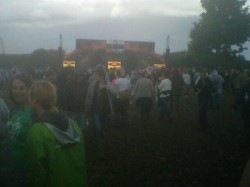 The partnership is a thriving success, and set to get even bigger and better. Leeds Met itself supports the work of Rebekka and the team actively because, as she tells me, it is good for “graduate-ness” and the impressive profile of the university in promoting its students as rounded, employable young people.
The partnership is a thriving success, and set to get even bigger and better. Leeds Met itself supports the work of Rebekka and the team actively because, as she tells me, it is good for “graduate-ness” and the impressive profile of the university in promoting its students as rounded, employable young people.
I’ve been teased for alluding to Oxford in my blog this month more than my home district of Halton. So rather than naming them directly (though I may have just let it slip…), let’s just say that this is something in which academics at other top institutions comprehensively fail. As much as I loved kindling a passion for D.H. Lawrence or James Joyce, or realizing that Caryl Churchill was right (sort of), or exploring the seventeenth-century print culture of Grub Street that made newspapers and magazines what they are today, the most important experiences I had at Oxford that I will take into my professional life were not in the hot and musty study of some half-interested don – but rather they came when I spread myself far out from the classroom. That’s what higher education has to be about if it is to be worth investing money you haven’t even earned yet (something university applicants and academics alike have to appreciate). From what I saw, the partnership between Leeds Met and Festival Republic is a shining example of how that should be done.
Indeed for Rebekka the partnership goes to the heart of her academic interests, writing as she does on the captivating power of the festival culture in our times, as well as on academic and artistic identity – on which subject her PhD will soon be in the Leeds Met library.
As prospective students across the country are now more than ever rightly asking what value they will get for their money from any college or university, Leeds Met offer something truly special and unique. Rebekka has heard of students who apply to the university in large part because they have heard about the Festival Republic partnership. Festival-goers this weekend may have had to don their wellies, but the folks at Leeds Met are by no means stuck in the mud.
For further background as to Mark’s challenge check out ‘28 days later’